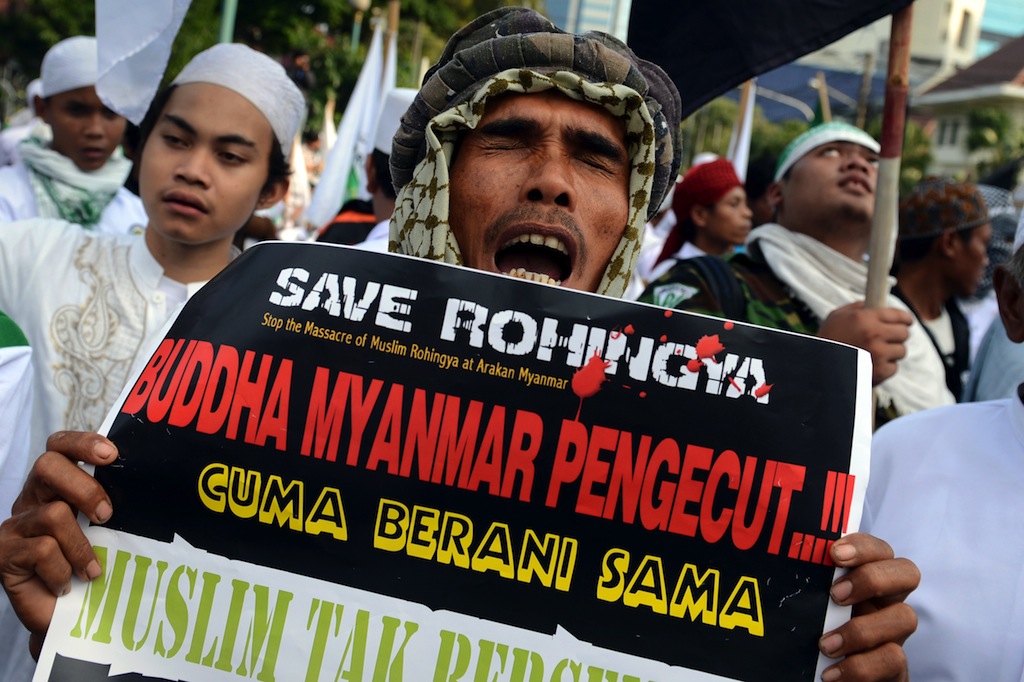
RNA - Bangladeshis demonstrated in the capital Dhaka after Friday prayers, with more Muslims protesting in Kuala Lumpur, Jakarta and Bangkok to call for a halt to "ethnic cleansing" and "genocide" in Myanmar's northern Rakhine state.
Malaysia's cabinet issued an unusually strong-worded statement, condemning the violence, urging "the government of Myanmar to take all necessary actions to address the alleged ethnic cleansing."
It said the Myanmar ambassador would be summoned over the crisis as Malaysians marched through a heavy tropical downpour from a Kuala Lumpur mosque to Myanmar's embassy.
In Jakarta, Indonesians protested outside Myanmar's embassy and called for the government of the world's most populous Muslim nation to break off diplomatic ties with Myanmar.
They also called for the 1991 Nobel Peace Prize for Myanmar's de facto leader Aung San Suu Kyi to be revoked.
Suu Kyi, promoted in the West as a democracy icon, stood accused of failing to protect Rohingya Muslims from what rights groups say is a systematic campaign of abuse by the army.
She has remained silent despite mounting evidence of army abuses in Rakhine State, including UN acknowledgement of "ethnic cleansing" of the Muslim minority.
Suu Kyi's failure to speak out in support of the Rohingya "is baffling to an international audience that persists in casting her as a human rights icon," David Mathieson of Human Rights Watch said on Friday.
"One version to explain her silence is callous indifference, another is calculated limited messaging... but the most likely is she simply has no control over the Burmese army."
Researchers at Queen Mary University London said her silence amounts to "legitimizing genocide" and entrenching "the persecution of the Rohingya minority".
"Despite the fact that this is the most significant test of Suu Kyi's leadership, the country's de facto leader has remained remarkably indifferent," they said this week.
In Dhaka, protesters gathered outside the country's largest mosque to demand an end to the violence, denounce Suu Kyi, and call for Bangladesh to accept fleeing Rohingya.
The spontaneous expressions of outrage came as horrifying stories of gang rape, torture and murder emerged from among the thousands of Rohingya Muslims who have fled to Bangladesh.
The UN says up to 30,000 of the impoverished ethnic group have abandoned their homes after troops poured into the narrow strip earlier this month.
A UN refugee agency official, John McKissick, said on Thursday that troops were "killing men, shooting them, slaughtering children, raping women, burning and looting houses, forcing these people to cross the river" into Bangladesh.
"It's very difficult for the Bangladeshi government to say the border is open because this would further encourage the government of Myanmar to continue the atrocities," he said.
Buddhist-majority Myanmar views the Rohingya with hatred, calling them "Bengali" even though many have lived there for generations.
On Friday, Mohammad Ayaz recounted to the French news agency AFP how troops attacked his village and killed his pregnant wife.
Cradling his two-year-old son, he said troops killed at least 300 men in the village market and gang-raped dozens of women before setting fire to around 300 houses, Muslim-owned shops and the mosque.
"They shot dead my wife, Jannatun Naim. She was 25 and seven months pregnant. I took refuge at a canal with my two-year-old son, who was hit by a rifle butt," Ayaz told AFP.
Farmer Deen Mohammad said troops took his two boys, aged nine and 12, adding he didn't know what happened to them.
"They took women in rooms and then locked them from inside. Up to 50 women and girls of our village were tortured and raped," he said.
Mohammad said houses in his village were burned, echoing similar testimony from other recent arrivals.
Human Rights Watch said this week it had identified more than 1,000 houses in Rohingya villages that had been razed in northwestern Myanmar using satellite images.
The alleged atrocities are being committed in the face of international silence, especially from the US and other Western countries which have been developing closer ties with the Myanmar government.
847/940